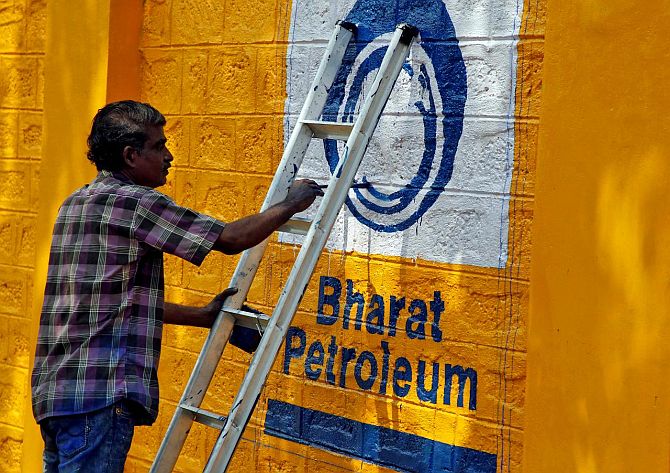Though the NDA government had been trying to privatise 20 companies, a decision for which was taken in 2017, and included national carrier Air India, the investor community evinced little enthusiasm for any of them.
Now, with an in-principle approval for privatisation of BPCL, CCI and SCI, the government has taken the plunge again.

After the Atal Bihari Vajpayee government demitted office in May 2004, privatisation went off the agenda of successive Union governments, partly owing to serial controversies that attended those initial efforts.
Now, armed with a bigger majority in his second term, Narendra Modi has taken the risk of a big-bang privatisation initiative - the second under his prime ministership - to help the government meet its challenging Rs 1.05 trillion divestment target.
Though the NDA government had been trying to privatise 20 companies, a decision for which was taken in 2017, and included national carrier Air India, the investor community evinced little enthusiasm for any of them.
Now, with an in-principle approval for privatisation of Bharat Petroleum Corporation Limited (BPCL), Container Corporation of India (CCI) and Shipping Corporation of India (SCI) on November 20, the government has taken the plunge again.
The key difference between 2017 and now is that the companies are in the strategic sectors of petroleum, railway and shipping.
Of the three, the privatisation of BPCL will be relatively less consequential because the government will continue to majority-own two major oil marketing companies - Indian Oil Corporation and Oil India.
Concor, which is in the business of transporting containerised cargo, may not be a big loss from national security point of view.
In the shipping sector, however, after SCI there will be no state-owned shipping company.
Interestingly, the Union government first divested holding in SCI as part of its early experiments with stake sale in the 90s.
The government now holds 63.75 per cent.
The almost 16-year lull in privatisation has its roots in the controversies that the Vajpayee government courted when it divested Bharat Aluminium Corporation (Balco) in 2001 and Hindustan Zinc Ltd in 2002.
Both companies went to the Anil Agarwal-promoted Vedanta group but the government continues to have residual shareholding, which have not been divested so far - despite contractual obligations to do so - owing to legal tangles.
Sumit Bose, former divestment secretary, admits that the lull in privatisation could have been due to political controversies and legal problems, and the listing route was less contentious.
He, however, adds, “Privatisation was not part of the government policy then.
"The policy was to share the wealth with the people of India.
"Listing of companies (as opposed to privatisation) all ensured transparency and better management.”
Bose looks at this turn to privatisation as a policy change that could be intended to take the benefit of sale beyond just the company.
“The government probably wants to send a broader message that could help revive the economy,” he adds.
All three are more likely to get suitors than the debt-ridden Air India and other smaller loss-making peers.
But of the three, BPCL will be the first real test case for the Modi-led government’s return to privatisation.
For BPCL, Saudi Aramco, French major Total, BP Plc, Exxon Mobil, Reliance Industries (RIL) and the Adani group could all be potential buyers.
India’s biggest private petroleum company RIL, however, may be keen to buy a stake only along with its partners BP and Saudi Aramco rather than going solo.
The Mukesh Ambani-led company has already said it will dilute stakes in its both downstream refinery and marketing.
BP has been a partner for the company in oil and gas producing business since 2011.
Buying BPCL could help Total and Adani make a big debut in the downstream sector.
BPCL has a 24 per cent market share in the petroleum retailing business and three oil refineries in the south, west and central India.
“Post the government’s stake sale, we will not include the two-notch uplift from government support in BPCL’s rating.
"This could result in downgrade of BPCL’s ratings to Ba1, assuming there are no changes to its fundamental credit profile, including our assessment of liquidity and refinancing risk which could impact the BCA,” Vikas Halan, senior vice-president, Moody’s Investor Service said in a note earlier this week.
The sale will also trigger a change of control on some of BPCL’s bonds, which will require the new owners to redeem the bonds within 45 days of the change of control.
Further, BPCL’s foreign currency bondholders could also decide to treat the government stake falling below 50 per cent as an event of default, which would result in bonds being immediately repayable.
Any bond redemption will significantly increase BPCL’s refinancing risk, added the note.
As of November 22, 2019, BPCL had $2.3 billion of foreign currency bonds outstanding.
The company had cash and cash equivalents of Rs 970 crore as of September 30, 2019.
Since the BPCL subsidiary Numaligarh Refinery Limited (NRL) was set up under the Assam Accords and with protests being staged against the privatisation of the parent company, the government has decided to give 61.65 per cent in it to other government oil and gas companies.
Moody’s, however, says the sale will also reduce BPCL’s capital spending, as it is one of the largest project that the company is working on.
The government is also looking at IOC for bringing down its equity, in all likelihood through the stock exchange, but that too will depend on how the BPCL sale goes.












 © 2025
© 2025